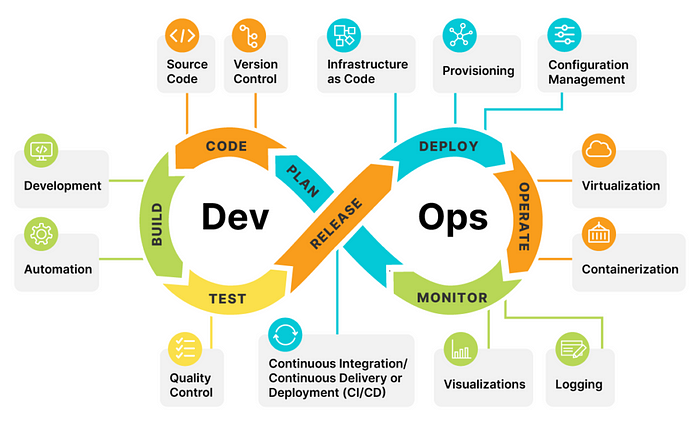#90DaysofDevopschallenge
Day-1 :Getting started with DevOps
Here is the day 1 summary of the #90DaysofDevops challenge
What is DevOps ?
DevOps is an evolving philosophy and framework that encourages faster, better application development and faster release of new or revised software features or products to customers.
DevOps is the combination of development (Dev) and operations (Ops), It encourages smoother, continuous communication, collaboration, integration, visibility, and transparency between them.

This closer relationship between “Dev” and “Ops” permeates every phase of the DevOps lifecycle: from initial software planning to code, build, test, and release phases and on to deployment, operations, and ongoing monitoring. This relationship propels a continuous customer feedback loop of further improvement, development, testing, and deployment. One result of these efforts can be the more rapid, continual release of necessary feature changes or additions.
Why is DevOps used ?
- Predictability: DevOps offers a significantly lower failure rate of new releases.
- Reproducibility: Version everything so that earlier versions can be restored anytime.
- Maintainability: Effortless recovery process in the event of a new release crashing or disabling the current system.
- Time to market: DevOps reduces the time to market up to 50% through streamlined software delivery. It is particularly the case for digital and mobile applications.
- Greater Quality: DevOps helps the team improve application development quality by incorporating infrastructure issues.
- Reduced Risk: DevOps incorporates security aspects in the software delivery lifecycle, and it helps reduce defects across the lifecycle.
- Resiliency: The Operational state of the software system is more stable, secure, and changes are auditable.
- Cost Efficiency: DevOps offers cost efficiency in the software development process,which is always an aspiration of IT management.
- Breaks larger code base into small pieces: DevOps is based on the agile programming method. Therefore, it allows breaking larger codebases into smaller and manageable chunks.
Benefits of DevOps
Some benefits of DevOps include:
· Faster, better product delivery
· Faster issue resolution and reduced complexity
· Greater scalability and availability
· More stable operating environments
· Better resource utilization
· Greater automation
· Greater visibility into system outcomes
· Greater innovation.
What is Automation ?
Automation is the use of technology to perform tasks with reduced human assistance. Automation typically refers to the use of software tools and scripts to perform tasks that would otherwise be done manually by a person. In DevOps automation is the practice of automating repetitive and manual DevOps tasks to be carried out without any human interaction. Automation can be applied throughout the DevOps lifecycle, spanning.
What is Scaling?
Scaling is the process of to increasing or decreasing resources as needed to meet changing demand. Businesses can scale up or down (vertically) and out or in (horizontally). Scale-up is done by adding more resources to an existing system to reach a desired state of performance. Scale-out is usually associated with distributed architectures For example, scaling up makes hardware stronger; scaling out adds additional nodes. In cloud computing, scaling is the process of adding or removing compute, storage, and network services to meet the demands a workload makes for resources in order to maintain availability and performance as utilization increases.
What is Infrastructure?
Infrastructure consists of physical and virtual resources, along with hardware, software, network resources, to support the management of servers in an IT environment. In cloud computing service Infrastructure as a service provides and manages IT infrastructures such as storage, server and networking resources, and delivers them to subscriber organizations via virtual machines accessible through the internet. It can have many benefits for organizations, such as potentially making workloads faster, easier, more flexible and more cost efficient.
I Hope you find this article useful.
Thank you so much for taking the time to read my article.
Basanagouda Patil
